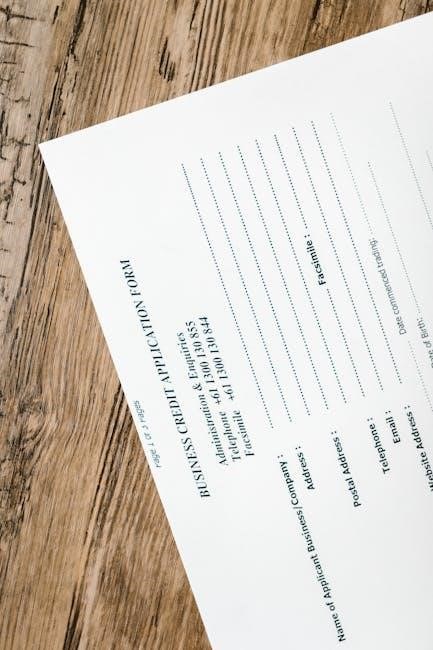Form CBT-100 is New Jersey’s Corporation Business Tax return, enabling businesses to report income, deductions, and taxes while ensuring compliance with state tax laws and procedures.
1.1 Overview of the Corporation Business Tax (CBT)
The Corporation Business Tax (CBT) is a tax imposed on corporations operating in New Jersey. It applies to various entities, including C corporations, S corporations, and unitary businesses. The CBT requires reporting of income, deductions, and tax credits. New Jersey mandates electronic filing for CBT returns, such as Form CBT-100, and has implemented combined reporting for certain groups. The tax ensures compliance with state regulations, promoting fair business practices and revenue generation for public services.
1.2 Purpose of Form CBT-100
Form CBT-100 is used by corporations to report income, deductions, and taxes owed under New Jersey’s Corporation Business Tax (CBT). Its purpose is to ensure accurate reporting and compliance with state tax laws. The form includes sections for income details, adjustments, deductions, and tax credits. It also requires attachment of federal tax forms like Form 1120 and other supporting documents. Proper completion ensures businesses meet their tax obligations and adhere to New Jersey’s filing requirements, promoting transparency and accountability.

Eligibility Criteria for Filing Form CBT-100
Corporations meeting specific income thresholds must file Form CBT-100. This includes C corporations, S corporations, and unitary businesses, with requirements adjusted for combined reporting starting in 2019.
2.1 Types of Corporations Required to File
Corporations required to file Form CBT-100 include C corporations, S corporations (filing CBT-100S), and unitary businesses (filing CBT-100U). Captive insurance companies not part of a combined group must file separately. Hybrid corporations and investment companies also fall under this requirement, ensuring all business entities comply with New Jersey’s tax regulations. Proper documentation and adherence to instructions are essential for compliance and accurate reporting.
2.2 Income Thresholds and Filing Requirements
All corporations with a New Jersey nexus must file Form CBT-100, regardless of income level. New Jersey mandates electronic filing for Corporation Business Tax returns, starting with tax year 2019. Corporations must meet specific income thresholds and adhere to electronic payment requirements. Failing to file or pay by deadlines may result in penalties. Proper documentation, including federal forms like Form 1120, is essential for accurate reporting and compliance with state tax regulations. Timely submissions are critical to avoid deficiencies.
Variants of Form CBT-100
Form CBT-100 has variants: CBT-100S for S corporations and CBT-100U for unitary businesses, each tailored to specific taxpayer needs under New Jersey tax regulations.
3;1 CBT-100 for C Corporations
Form CBT-100 is the primary tax form for C corporations in New Jersey, requiring them to report income, deductions, and taxes. It must include a copy of the federal Form 1120. Corporations must adhere to electronic filing mandates and ensure accurate reporting of all financial activities. Payments are made using Form CBT-100-V, and estimated taxes can be submitted via Form CBT-150. Proper documentation and adherence to instructions are essential for compliance with state tax regulations.
3.2 CBT-100S for S Corporations
Form CBT-100S is specifically designed for S corporations operating in New Jersey. These entities generally pay a statutory minimum tax, though certain types of income may alter this requirement. The form requires detailed reporting of income, deductions, and credits, with documentation such as Schedule NJ-K-1 for shareholder distributions. Electronic filing is mandated, and payments are made using CBT-100S-V. Estimated taxes are submitted via CBT-150, ensuring compliance with state tax regulations for S corporations.
3.3 CBT-100U for Unitary Business Groups
Form CBT-100U is used by unitary business groups to file a consolidated Corporation Business Tax return in New Jersey. It requires reporting of all assets, liabilities, income, and expenses on a consolidated basis. The form is mandatory for businesses operating as a single entity and includes specific lines for investment companies and real estate investment trusts. Documentation such as federal Form 1120 must be included. Electronic filing is required for all CBT-100U submissions, ensuring compliance with state tax regulations for unitary business groups.

Gathering Necessary Documentation
Corporations must gather federal tax forms (e.g., Form 1120) and financial statements to accurately complete Form CBT-100. Supporting documents ensure compliance and proper reporting.
4.1 Federal Tax Forms (e.g., Form 1120)
Corporations must include a complete copy of their federal Form 1120 or other relevant federal corporate tax returns when filing Form CBT-100. This ensures consistency and accuracy in reporting income, deductions, and credits. The information from these federal forms is crucial for completing state-specific sections of the CBT-100. Proper documentation helps prevent discrepancies and ensures compliance with New Jersey tax requirements.
4.2 Financial Statements and Supporting Documents
Accurate financial statements and supporting documents are essential for completing Form CBT-100. These include balance sheets, income statements, and documentation for deductions and credits. Corporations must ensure all figures align with federal returns and adhere to New Jersey tax laws. Proper documentation prevents errors and ensures compliance during audits. Including detailed records helps verify the accuracy of reported income, expenses, and tax credits, streamlining the filing process and reducing the risk of discrepancies.

Completing Form CBT-100
Form CBT-100 requires accurate reporting of income, deductions, and taxes, ensuring compliance with New Jersey tax laws and alignment with federal forms for correct filing.
5.1 Reporting Income and Adjustments
Accurately report all income, including federal taxable income from Form 1120, and adjustments specific to New Jersey tax laws. Ensure proper alignment with state-specific deductions and credits. Include Schedule A for federal income and Schedule B for adjustments. Verify all figures align with financial statements and supporting documents. Avoid errors in reporting pass-through entities or unitary groups. Double-check calculations for accuracy and compliance with New Jersey tax regulations to prevent discrepancies and ensure timely filing.
5.2 Calculating Deductions and Credits
Calculate deductions and credits accurately by following New Jersey-specific rules. Ensure all federal deductions are adjusted to comply with state regulations. Claim applicable credits, such as tax credits for investments or initiatives, and document them properly. Refer to federal Form 1120 for income reporting but adjust for state-specific deductions. Avoid common errors, such as missing deadlines or miscalculating credits. Ensure all calculations align with financial statements and supporting documents for compliance and accuracy.
5.3 Determining Tax Liability
Calculate total tax liability by summing adjustments, deductions, and credits from previous sections. Ensure all figures align with financial statements and federal forms like Form 1120. Accurately report income and apply applicable tax rates. Verify calculations for accuracy and compliance with New Jersey tax laws. Avoid errors in arithmetic or reporting to prevent deficiencies. Ensure all adjustments are properly documented and align with state-specific rules. Refer to line 22 of Form CBT-100 for final tax liability determination.

Filing Methods and Deadlines
Electronic filing is mandatory for CBT-100, CBT-100S, and CBT-100U forms in New Jersey. Ensure timely submission by the designated deadline to avoid penalties and compliance issues.
6.1 Electronic Filing Requirements
Electronic filing is mandatory for CBT-100, CBT-100S, and CBT-100U forms in New Jersey. Corporations must submit their returns electronically to comply with state tax regulations. Ensure all required documents, including federal Forms 1120, are attached digitally. Payments must also be made electronically using CBT-100-V. The system allows scheduling multiple payments via e-check or credit card. Timely electronic submission avoids penalties and ensures compliance with filing deadlines; Always verify submission confirmations to confirm successful filing.
6.2 Deadline for Submission
The deadline for submitting Form CBT-100 is typically April 15th for calendar-year corporations. Extensions can be requested using Form CBT-200-T, extending the deadline to October 15th. Late submissions may result in penalties and interest. Ensure timely filing to avoid additional charges. If an extension is granted, payment of the tax liability is still due by the original deadline to prevent penalties. Always verify the submission deadline and plan accordingly to meet compliance requirements.

Payment Instructions
Use Form CBT-100-V for payments, ensuring timely submission by the tax deadline. Electronic filing is mandatory for all payments to comply with state regulations efficiently.
7.1 Using Form CBT-100-V for Payments
Form CBT-100-V is used to remit the Total Balance Due as reported on the tax return. Electronic filing is mandatory for all payments, ensuring timely submission. Payments can be made using e-check for multiple transactions or credit/debit cards for single payments. The payment voucher must accompany the return to avoid processing delays. Proper documentation and adherence to instructions are crucial for compliance.
7.2 Estimated Tax Payments (CBT-150)
Corporations required to make estimated tax payments must file Form CBT-150. Payments can be scheduled multiple times via e-check or made as a single payment using an e-check or credit card. Quarterly payments are due on April 15th, June 15th, September 15th, and January 15th of the following year. Accurate estimation of tax liability is crucial to avoid underpayment penalties. Ensure all payments align with the corporation’s expected tax obligation for the year. Visit official state resources for detailed guidance and to file electronically.

Credits and Deductions
Form CBT-100 allows businesses to claim various tax credits and deductions. Common deductions include operating expenses and capital investments, while specific credits like research incentives reduce tax liability effectively.
8.1 Available Tax Credits
Form CBT-100 allows businesses to claim various tax credits. These include credits for research and development, job creation, and investments in specific industries or locations. Additionally, businesses may qualify for renewable energy credits or historic preservation credits. Each credit requires proper documentation, such as filing Form CBT-100-V for payments or submitting additional forms for specific programs. These credits can significantly reduce tax liability when accurately applied. Businesses must ensure all documentation aligns with state requirements to avoid deficiencies or penalties.
8.2 Common Deductions for Businesses
Common deductions for businesses on Form CBT-100 include operating expenses, salaries, rent, and interest on loans. Businesses can also deduct depreciation and amortization costs. Additionally, certain expenses like travel and entertainment, within IRS guidelines, may qualify. Proper documentation, such as financial statements and receipts, is essential to support these deductions. Accurate reporting ensures compliance and maximizes tax savings, aligning with state requirements to avoid discrepancies or penalties during audits.

Extensions and Amended Returns
Use Form CBT-200-T to request a filing extension for Form CBT-100. Amended returns can be submitted to correct errors or omissions in previously filed returns, ensuring accuracy and compliance.
9.1 Filing for an Extension (CBT-200-T)
Use Form CBT-200-T to request a six-month filing extension for Form CBT-100. The extension allows additional time to file the return but does not extend the payment deadline. Corporations must submit the form electronically through New Jersey’s tax portal. The request must be made by the original filing deadline to avoid penalties. Ensure all required information is accurately provided to secure the extension. Late payments may result in interest and penalties, so any owed taxes should be paid by the original due date.
9.2 Submitting an Amended Return
To correct errors or update information on a previously filed CBT-100, businesses must submit an amended return. Use the same form as the original filing, clearly indicating adjustments on the appropriate lines. Attach a detailed explanation of the changes and any supporting documentation. Amended returns must be filed electronically and are subject to the same requirements as the initial return. Ensure accuracy to avoid delays or penalties. The amended return should only reflect necessary corrections without altering unrelated information.

Common Mistakes to Avoid
Ensure accuracy in reporting income, deductions, and credits. Avoid missing deadlines or failing to include required federal forms like Form 1120. Double-check calculations and submissions.
10.1 Incomplete or Inaccurate Information
Ensure all fields in Form CBT-100 are filled accurately. Missing or incorrect data, such as business income, deductions, or federal ID numbers, can lead to processing delays or penalties. Always verify financial statements and supporting documents before submission. Pay attention to details like asset values and expense calculations. Incomplete schedules or unsigned returns may result in rejection. Double-check every entry to maintain compliance and avoid issues with the New Jersey Division of Taxation.
10.2 Missing Deadlines or Payments
Failing to meet the filing deadline for Form CBT-100 or making late payments can result in penalties and interest. Ensure timely submission of returns and payments to avoid additional charges. Use electronic filing for faster processing and payment tracking. If unable to pay in full, consider setting up a payment plan to minimize penalties. Missing deadlines can also delay refunds or credits, so mark the submission date and payment due date clearly to maintain compliance with New Jersey tax requirements.

Professional Assistance and Resources
Consulting a tax professional ensures accurate filing of Form CBT-100. Utilize official state resources, including guides and FAQs, for detailed instructions and support throughout the process.
11.1 Consulting a Tax Professional
Consulting a tax professional is highly recommended for accurate and efficient filing of Form CBT-100. A tax expert can navigate complex rules, ensure compliance, and optimize deductions. They provide tailored guidance on income reporting, deductions, and credits, reducing errors and potential penalties. Professionals stay updated on tax law changes, such as combined reporting requirements, ensuring adherence to New Jersey’s specific regulations. Their expertise simplifies the process, saving time and minimizing risks, especially for complex returns like CBT-100U or CBT-100S.
11.2 Accessing Official State Resources
Official state resources provide essential guidance for completing Form CBT-100. The New Jersey Division of Taxation website offers downloadable forms, detailed instructions, and FAQs. Utilize these resources to ensure accuracy and compliance with state tax laws. Additionally, access electronic filing systems for efficient submission of returns, payments, and extensions. Always refer to official sources for the most up-to-date information and requirements, ensuring your filing process is smooth and error-free.
